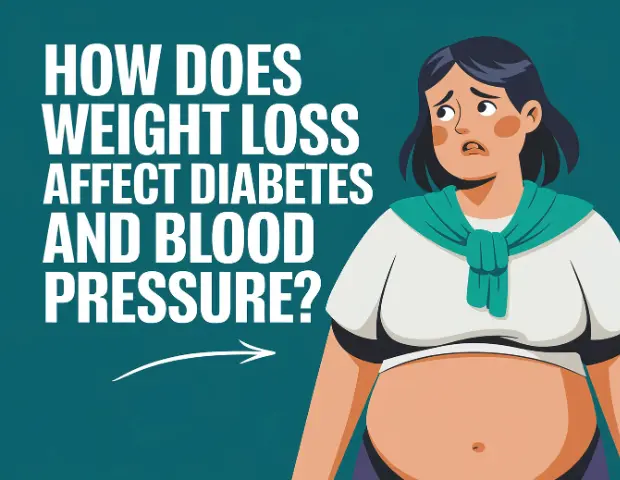How Does Weight Loss Affect Diabetes and Blood Pressure?
The relationship between weight loss and diabetes has garnered significant attention in recent years. Many individuals grappling with diabetes often wonder how weight loss affects their condition, particularly regarding blood pressure. With obesity being a major risk factor for diabetes and hypertension, understanding the intricate connections between these factors can pave the way for healthier lifestyles. This article delves into the various aspects of how weight loss affects diabetes and blood pressure, exploring critical topics such as the impact of diabetes on weight, the benefits of shedding pounds, dietary and exercise roles, ideal weight considerations, and the importance of guidance for diabetic patients.

The Relationship Between Weight Loss and Diabetes
Losing weight is vital for effectively managing diabetes. Research shows that even a modest weight reduction—typically around 5% to 10% of total body weight—can significantly improve insulin sensitivity and glucose control. When individuals lose weight, their bodies require less insulin to maintain blood sugar levels, leading to improved overall health. For many, this weight loss journey translates into a reduction in medication, allowing for a more manageable diabetes experience.
Furthermore, the connection between weight loss and diabetes management extends beyond blood sugar control. Shedding excess pounds can alleviate the burden on the cardiovascular system, reducing the risk of developing complications such as heart disease. Thus, maintaining a healthy weight is a vital aspect of diabetes management and can lead to a healthier, more vibrant life.
What Is the Impact of Diabetes on Weight?
Diabetes can significantly influence an individual’s weight. For some, the condition may lead to weight gain due to insulin resistance and the body’s inability to utilize glucose effectively. This can result in increased fat storage, contributing to obesity. Conversely, other individuals with diabetes may experience weight loss due to factors such as poor appetite, increased urination, or a lack of nutrient absorption.

Understanding how diabetes affects weight is crucial for developing effective weight management strategies. By addressing the underlying factors that contribute to weight fluctuations, individuals can better navigate their health journeys. Seeking guidance from healthcare professionals can further assist in identifying personalized approaches to maintaining a healthy weight.
Benefits of Weight Loss for Diabetic Patients
Weight loss offers numerous benefits for individuals living with diabetes. Here are ten notable ways in which shedding pounds can improve their health:
- improved blood sugar control: weight loss enhances insulin sensitivity, allowing the body to utilize glucose more effectively.
- reduced need for medication: many diabetic patients can decrease their medication dosages or even eliminate them altogether with significant weight loss.
- lower blood pressure: shedding pounds can reduce pressure on blood vessels, leading to healthier blood pressure levels.
- decreased cholesterol levels: weight loss can improve lipid profiles, reducing the risk of heart disease.
- enhanced energy levels: losing weight often leads to increased vitality and reduced fatigue.
- improved mood: weight loss can positively affect mental health, reducing anxiety and depression.
- better sleep quality: maintaining a healthy weight can lead to improved sleep patterns and reduced sleep apnea.
- increased mobility: shedding excess weight often improves joint function and overall physical mobility.
- reduced inflammation: weight loss can decrease systemic inflammation, positively impacting overall health.
- healthier lifestyle habits: the journey of losing weight often encourages individuals to adopt healthier eating and exercise habits.
these benefits underline the significance of weight management in diabetes care, emphasizing the importance of adopting sustainable weight loss strategies.
The Role of Diet and Exercise in Weight Loss for Diabetic Patients
diet and exercise are fundamental components of a successful weight loss strategy for diabetic patients.it’s important to embrace a balanced diet that includes a variety of whole foods, such as fruits, vegetables, lean proteins, and whole grains. such a diet not only promotes weight loss but also stabilizes blood sugar levels, providing a dual benefit for individuals managing diabetes.

additionally, incorporating regular physical activity into daily routines can enhance weight loss efforts. exercise aids in burning calories, building muscle mass, and improving overall metabolic health. for diabetic patients, activities such as walking, swimming, and strength training can be particularly effective in promoting fat loss and improving insulin sensitivity.
to further support diabetic patients in their weight loss journeys, here are some dietary tips:
- focus on portion control: understanding appropriate portion sizes can help manage calorie intake and promote weight loss.
- choose low-glycemic index foods: these foods have a slower impact on blood sugar levels, providing sustained energy without spikes in glucose.
- stay hydrated: drinking plenty of water throughout the day can aid in appetite control and support overall health.
- plan meals ahead of time: meal planning can help ensure balanced nutrition and prevent impulsive, unhealthy food choices.
What Is the Ideal Weight for Diabetic Patients?
determining the ideal weight for diabetic patients can vary based on factors such as age, gender, height, and overall health. while there are general guidelines available, it’s essential for individuals to work with healthcare professionals to establish personalized weight goals that take their unique circumstances into account.
for many diabetic patients, achieving a body mass index (bmi) in the healthy range (18.5 to 24.9) is often recommended. however, even modest weight loss can yield significant health benefits, particularly for those who are overweight or obese. thus, rather than focusing solely on a specific number on the scale, individuals should prioritize overall health and well-being.
The Importance of Guidance in Weight Loss for Diabetic Patients
navigating the complexities of weight loss while managing diabetes can be challenging. therefore, seeking guidance from healthcare professionals, such as registered dietitians, certified diabetes educators, and physicians, is crucial. these experts can provide tailored advice, meal plans, and exercise recommendations based on individual health profiles.
in addition to professional guidance, support from family and friends can also play a vital role in a diabetic patient’s weight loss journey. surrounding oneself with a positive support system can enhance motivation and accountability, making the path to weight loss more achievable.
understanding how weight loss affects diabetes and blood pressure is essential for managing these interconnected health conditions. with the right strategies, including diet, exercise, and professional guidance, individuals can successfully navigate their weight loss journeys. ultimately, weight loss not only improves diabetes management but also promotes overall health and well-being. as individuals embark on their journeys to weight loss, they can find empowerment in knowing that they are taking proactive steps toward a healthier future.